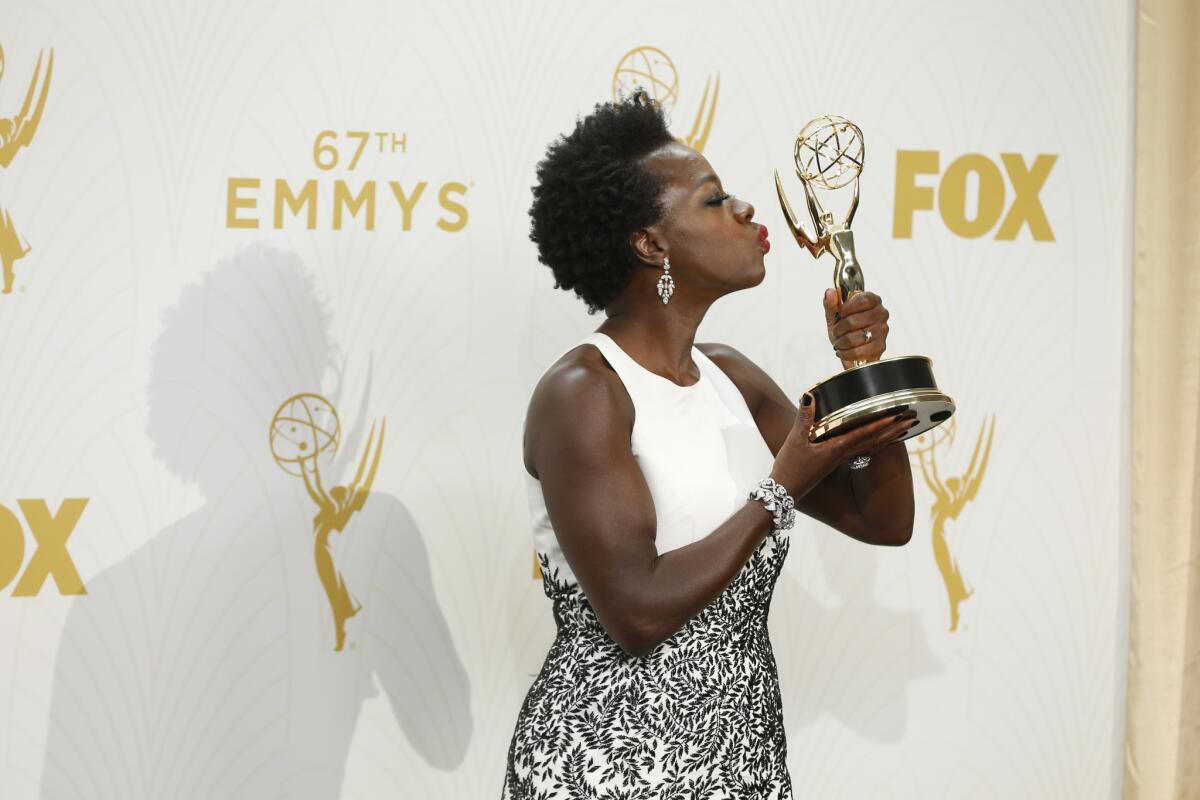Emmy winner Viola Davis says ‘it doesn’t end here’

Viola Davis poses with her award at the Primetime Emmy Awards at the Microsoft Theater on Sept. 20.
Viola Davis’ Emmy win for lead actress in a drama had her feeling a certain way.
“I feel really good, which if you knew me, you would know how rare that is,” she told reporters backstage at the Microsoft Theater during Sunday night’s awards telecast. “I’m always thinking about the work, I’m always thinking about how to keep myself grounded.”
Davis took home the gold for her portrayal of ruthless law professor and defense attorney Annalise Keating in the Shonda Rhimes-produced “How To Get Away With Murder” on ABC.
At the same time, Davis became the first African American to win an Emmy for best actress in a drama. Prior to Sunday night, her nomination along with that of “Empire’s” Taraji P. Henson generated a lot chatter because it marked the first time two African American actresses were recognized in the lead actress drama category.
During her speech Sunday night, Davis addressed the diversity paradox in Hollywood.
“You cannot win an Emmy for roles that are simply not there,” she said.
The historic win also doesn’t mean we’ve completely reached a turning point, she was quick to remind reporters backstage.
“I keep saying the same quote over and over, because it hit me so hard, is that stories never end. My story doesn’t end here. ... I just think that there is so much work that needs to be done in so many areas in the business with actors of color. So many narratives that need to be seen by people, so many stories that need to be seen and felt, that I know that it doesn’t end here.”
But she said she hopes we reach the turning point soon, so that we can move past talking and writing about “The First Black Actress ...” kind of moments.
“Not just stop saying it, but also stop writing it,” she said. “One of the things that I admire about Shondaland is Annalise Keating was not written specifically for a black woman. I made her black because I’m black.
“But what needs to happen in the writing is when you put pen to paper, you’ve got to let your imagination fly,” she continued. “When you go to acting school and study Chekhov and Shakespeare and Arthur Miller and August Wilson, you just think that the sky is the limit in terms of how you can portray a human being. It’s only until you get out there in your profession that people say you can only be a judge, you’re not cute enough to be a leading lady, you can only be a doctor, you can only be authoritative, you can only be what we define as black. I don’t know what that means.”
I tweet about TV (and other things) here: @villarrealy
MORE EMMYS:
Emmy Awards signal a new age of diversity on TV
Watch Andy Samberg’s opening musical bit at the Emmys
Jackie Collins overlooked in Emmys ‘In Memoriam’ tribute
Jon Hamm breaks his ‘Mad Men’ losing streak just in time
More to Read
The complete guide to home viewing
Get Screen Gab for everything about the TV shows and streaming movies everyone’s talking about.
You may occasionally receive promotional content from the Los Angeles Times.







